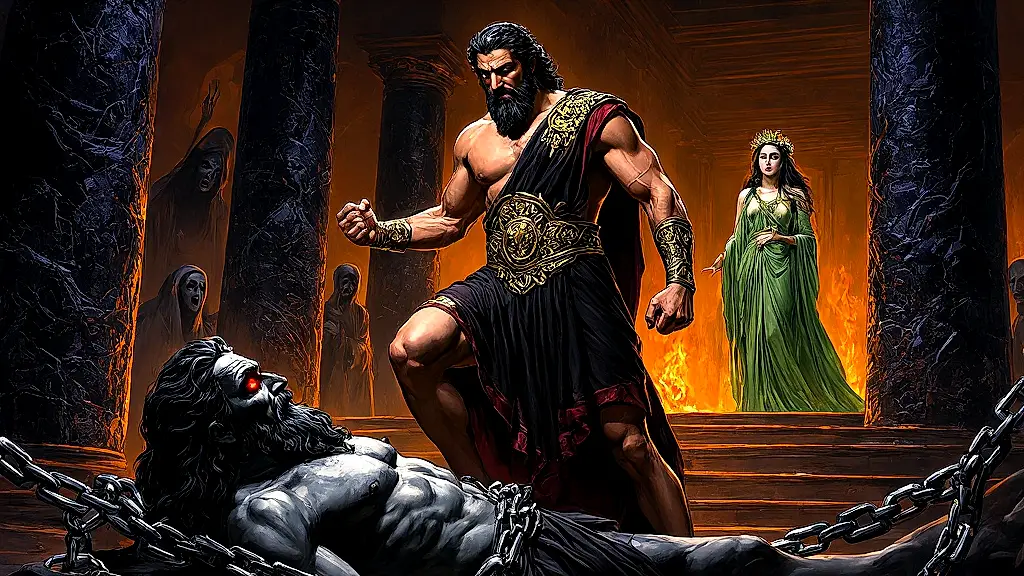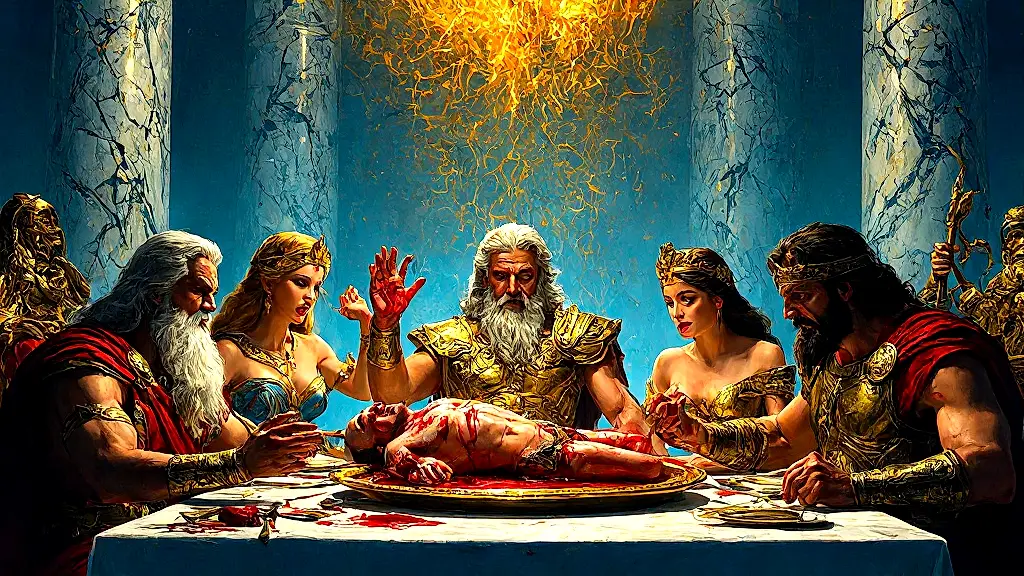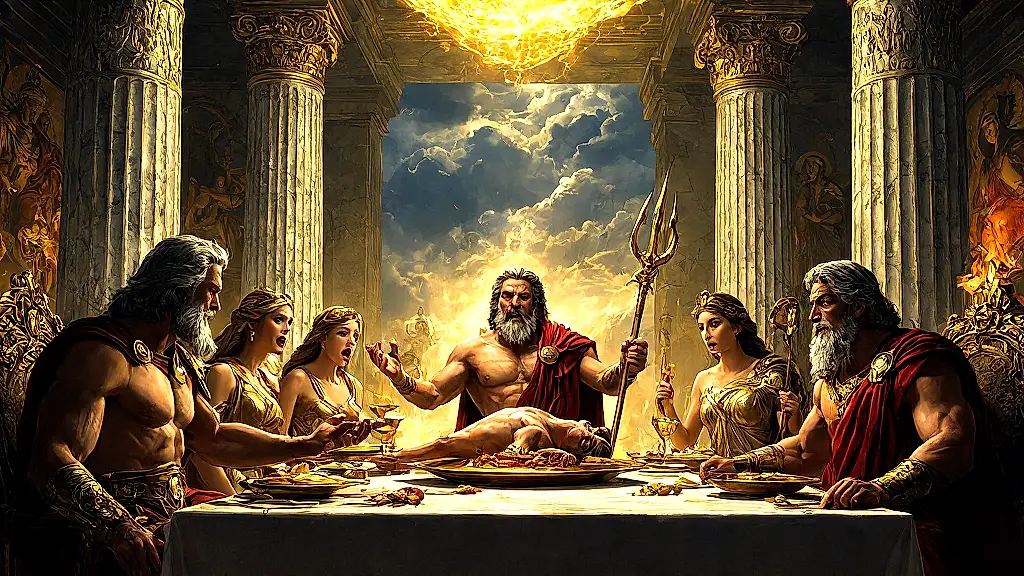Famous Examples Of Punishment In Greek Mythology
In Greek mythology, divine punishment wasn’t just about payback – it kept the entire universe in order. Picture a world where the gods acted as strict judges, with no room for mercy. If you broke the rules, the punishment never ended. Prometheus had his liver eaten by an eagle. Sisyphus pushed a boulder forever.
Key Points:
- Prometheus got endless torment for giving fire to humans—an eagle ate his liver daily, but it grew back each night.
- Sisyphus had to push a boulder uphill forever because he tricked death twice, making his punishment fit his crime.
- Tantalus faced never-ending hunger and thirst after serving his son as food to the gods, breaking sacred hospitality rules.
- Arachne turned into a spider for boasting she wove better than Athena, her skill now just spinning webs.
- Tartarus, the deepest underworld pit, held the worst offenders like the Titans and Ixion, guarded by hundred-handed giants.
- Greek gods punished harshly to keep order—hubris (too much pride) and breaking guest-host rules led to the worst penalties.
- These myths taught Greeks their place—defying gods or overstepping limits meant endless suffering.
These myths show what the Greeks believed about pride, morality, and the sacred laws of hospitality (xenia). Different writers told these stories in different ways. Hesiod’s Theogony doesn’t always match Ovid’s Metamorphoses. But the main lesson stays the same: defying the gods led to severe consequences. As you read these tales, you’ll see how they reflect Greek ideals, from obeying the gods to the dangers of arrogance.
Let’s understand why the punishments were so harsh and what they taught people about their place in the world.
Punishment In Greek Mythology: Overview and Key Facts
| Figure | Crime/Offense | Punishment | Symbolic Meaning | Primary Sources | Variations |
|---|---|---|---|---|---|
| Prometheus | He stole fire from the gods and gave it to humans. | Chained to a rock, his liver was eaten daily by an eagle. It grew back each time. | Rebelling against the gods had a price, but it helped humans advance. | Hesiod’s Theogony | Some stories say Heracles later freed him. |
| Sisyphus | He cheated death twice and betrayed Zeus. | He had to push a boulder up a hill forever, but it always rolled back down. | His punishment showed how pointless it was to escape fate. | Homer’s Odyssey | Later versions claim he tried to trick the gods again. |
| Tantalus | He killed his son and served him as food to test the gods. | He was always hungry and thirsty, but food and water moved away when he reached for them. | This was divine justice for breaking sacred hospitality and family bonds. | Pindar’s Olympian Odes | Some myths say he was also thrown into Tartarus. |
| Arachne | She bragged that she wove better than Athena and insulted the gods. | Athena turned her into a spider. Now she weaves forever. | Her pride angered the gods, and her talent became a punishment. | Ovid’s Metamorphoses | Earlier versions might not mention her becoming a spider. |
| Danaides | They murdered their husbands (except one) on their wedding night. | They spent forever trying to fill a broken jar with water in the Underworld. | This was their penalty for betrayal and murder. | Apollodorus’ Bibliotheca | The number of sisters changes in different stories. |
| Ixion | He tried to trick Hera and also killed his father-in-law. | The gods tied him to a wheel that never stopped burning and spinning. | His punishment reflected betrayal of both gods and mortals. | Pindar’s Pythian Odes | A few versions say Zeus felt sorry for him at first. |
Note: Greek myths often change depending on the source. This table covers the most common versions.
Prometheus: The Titan Who Crossed Zeus
Prometheus stood out even among rebels. When he defied Zeus, it resulted in one of the worst punishments in Greek myths – one that would never end.
Stealing Fire and the Fallout

Why would a Titan risk angering Zeus? Prometheus didn’t just rebel – his theft of fire changed human history forever. According to Hesiod’s Theogony, he stole fire from Olympus (some say hiding it in a plant stalk) and gave it to humans. This let them develop technology and culture. Zeus reacted fiercely. First he took fire away from humans.
Then he ordered Hephaestus to create Pandora, the first woman. She carried a jar (later called a box by mistake) that released sickness, pain, and hardship when opened. This showed what happened when humans opposed the gods.
Key Events in the Conflict:
- The Theft: Prometheus got past Zeus’ guards to bring fire to humans
- Zeus Strikes Back: He took fire away, leaving humans in darkness
- Pandora’s Creation: Zeus made Pandora, whose actions brought suffering to the world
The punishments matched the crimes. Just as Prometheus gave fire to humans, Zeus gave them Pandora – both with lasting consequences.
Prometheus stole fire from the gods and gave it to humans, which led Zeus to create Pandora and bring suffering to the world.
The Eagle and the Never-Ending Liver

Zeus created a punishment for Prometheus that was both clever and extremely painful. He chained the Titan to the Caucasus mountains where an eagle would eat his liver every day. The liver grew back each night, which meant the torment never ended. This punishment had special meaning because the ancient Greeks thought the liver controlled emotions and could heal itself.
Modern science actually proves the liver can regrow most of its mass, though not endlessly like in the myth.
Here’s how the ancient beliefs compare to what we know today:
| Aspect | Mythological Belief | Modern Scientific Understanding |
|---|---|---|
| Liver Regeneration | Grew back completely every day | Can regrow up to 70% of its size |
| Significance | Controlled feelings and life force | Filters toxins from the body |
| Duration | Lasted forever | Only works up to a point |
| Symbolism | Showed endless suffering | Represents the body’s healing power |
Zeus chose the liver because it was vital and emotional. This showed how powerful the gods really were. Every morning, Prometheus knew the eagle would come again, with no chance of escape.
How Prometheus Shaped Myths and Medicine

The Prometheus myth had a lasting impact on medical history. His regenerating liver became a long-standing symbol of healing because it regrew daily, which modern science confirms actually happens to some degree. Ancient Greek physicians observed this ability to regrow, so they saw Prometheus as a patron of medicine.
This connection was so strong that 16th century anatomy books like Vesalius’ Fabrica actually showed his punishment. While Hermes‘ staff (called a caduceus, often wrongly used as a medical symbol) gets more attention, Prometheus’ real influence appears in how doctors make important discoveries. This idea of the “Promethean healer” shows medicine advancing against limits. Even today, scientists studying liver regeneration frequently reference the myth.
It proves how ancient stories continue to influence how we study the human body, especially when looking at the liver’s unique healing abilities.
Sisyphus: The Man Who Tricked Death
While Prometheus defied Zeus, Sisyphus used his cleverness to cheat Death itself. However, this boldness led to his well-known eternal punishment, which we’ll explain in detail.
Outsmarting Hades Twice

Sisyphus pulled his first and boldest trick when Thanatos came to take his soul. He used magical shackles to trap the god of death itself, which meant nobody could die. This caused complete chaos until Ares finally freed Thanatos. What made this especially problematic was how it seriously threatened the natural order – with unkillable warriors and overcrowded cities everywhere. But Sisyphus wasn’t finished.
After eventually being taken to the Underworld, he persuaded Persephone that his wife had failed to perform proper burial rituals. This earned him temporary release, which he abused by simply returning to his normal life. He became the only person to escape death twice. Some stories even say he deceived Hades by asking how shackles worked, then trapping him instead.
The Pointless Boulder Roll

For repeatedly cheating death, the gods sentenced Sisyphus to Tartarus, where he must push a huge boulder up a steep hill. It always rolled back down whenever he nearly reached the top. Ancient sources disagree about the boulder’s size – Homer wrote it was marble-sized, while later versions claimed it was house-sized. Yet all agree its weight made the task impossible.
This punishment directly relates to his crimes. Just as he disrupted life’s natural cycle, he now faced a never-ending cycle of pointless labor. Zeus designed this punishment to be both clever and harsh, matching Sisyphus’s own cunning. Interestingly, modern psychology would later use “Sisyphean task” to describe similarly hopeless efforts, showing how this ancient story still applies today.
Sisyphus was punished by the gods with endless, impossible labor—rolling a heavy boulder up a hill only for it to roll back down—because he kept cheating death and upsetting life’s natural order.
Tantalus: When a Godly Feast Backfired
While Sisyphus cheated death, King Tantalus did something worse to the gods. His terrible crime resulted in never-ending torment that made his name famous for punishment.
Cooking His Son for the Gods

King Tantalus committed the worst possible breach of Greek hospitality when he killed his son Pelops, boiled the body, and served it to the Olympian gods. Some sources say he wanted to test their all-knowing nature, while others claim he tried to share divine food. Imagine serving human flesh to guests at an important dinner – this was Tantalus’s unforgivable act.
Although most deities reacted with disgust, Demeter – who was grieving for Persephone – accidentally ate part of Pelops’s shoulder. The gods recognized the deception and brought Pelops back to life, with Hephaestus making an ivory replacement for the missing shoulder. This act broke all the important rules of xenia (guest-friendship) and family loyalty that Greeks valued most.
Forever Thirsty, Forever Hungry

The gods created a punishment for Tantalus that matched his crime. He was forced to stand forever in a clear pool, but the water retreated whenever he tried to drink. Above him hung branches heavy with fruit that moved away when he reached up. This experience, described in Homer’s Odyssey, created the word “tantalize.” Some versions include a boulder constantly threatening to crush him.
However, all versions show how his punishment mirrored his crime. This mirrored how he had deceived the gods with false hospitality, now receiving nourishment he could never reach. His eternal frustration served as a clear warning against deception.
Arachne: The Weaver Who Riled Athena
While Tantalus was punished for tricking the gods, Arachne faced anger from the gods for a different reason. Her serious mistake was hubris – she dared to challenge Athena herself to a weaving contest.
A Mortal’s Arrogant Challenge

Arachne, an ordinary woman from Lydia who worked as a weaver, showed extreme arrogance by claiming her skills surpassed Athena’s. This was particularly bold since Athena invented weaving, as recorded in Ovid’s Metamorphoses. This would be like someone today saying they could outperform the creator of their craft.
Some versions say she wouldn’t admit Athena gave her talent, while other accounts suggest she simply wanted to prove she was better. In ancient Greece, where gods closely protected their areas of expertise, this kind of challenge crossed the important line between humans and deities.
Turned Into the First Spider

Angered by Arachne’s flawless but disrespectful tapestry that showed gods’ misdeeds, Athena carried out a fitting yet harsh punishment. She used magical herbs from Hecate’s garden, which changed the mortal into the world’s first spider, as described in Ovid’s Metamorphoses.
The transformation included:
- Complete physical change: Her body shrank while her limbs became eight thin legs
- Permanent ability shift: Her weaving skill turned into instinct, making webs instead of art
- Symbolic punishment: The master weaver could now only catch flies
This explains why scientists call spiders arachnids – a lasting mark of human arrogance. While other gods gave temporary punishments, Athena changed Arachne’s very nature, turning her talent into unavoidable natural behavior.
Athena turned Arachne into the first spider, changing her body and weaving skill forever as punishment for insulting the gods.
Tartarus: Where the Gods Send Rule-Breakers
Athena changed Arachne as a personal punishment, but the gods kept their harshest penalties for Tartarus. This deepest pit below Hades was where the worst offenders received endless punishment.
Layout and Its Monstrous Guards

The Greek underworld had three main layers. First came Hades, then Tartarus, and finally the endless space called Chaos. According to Hesiod’s Theogony, Tartarus was so deep it would take nine days to reach the bottom.
Poseidon built bronze walls around Tartarus, and the Hecatoncheires guarded it. These hundred-handed giants could throw many boulders at the same time. Here’s how the underworld was organized:
| Layer | Description | Guardians | Distance from Surface |
|---|---|---|---|
| Hades | Where souls go | Cerberus | Reachable by rivers |
| Tartarus | Prison for gods | Hecatoncheires | Much deeper than Hades |
| Chaos | Empty space | None | No bottom |
The three Hecatoncheires – Briareos, Cottus, and Gyges – each had fifty heads and one hundred arms. Because of them, Tartarus became a secure prison that even powerful Titans couldn’t escape from.
Famous Prisoners and Why They’re There

Tartarus contains many famous prisoners. The Titans were imprisoned after fighting against Olympus, as described in Hesiod’s Theogony. Ixion, who murdered family members and pursued Hera, must spin forever on a flaming wheel according to Pindar’s writings. The fifty Danaides sisters killed their husbands on their wedding night.
As punishment, they must constantly fill leaking water jars, mentioned in Apollodorus’ Library. Another prisoner was Salmoneus, who tried to copy Zeus‘ thunder with his chariot. Now he faces real thunder constantly, as Virgil described. Each punishment directly relates to their crimes. The Titans who wanted to rule heaven now hold it up from below. The Danaides’ murders became a never-ending task.
Even Cronus, once ruler of the universe, remains chained there. These punishments showed what happened to those who challenged the Olympian gods.
Common Themes in Divine Punishments
The lasting punishments given by the Greek gods show clear patterns in how they maintained their rules. Among these stories, two main themes appear repeatedly.
Overstepping Mortal Limits

The Greeks called this offense hubris (ὕβρις) – when mortals challenged the gods’ authority. Because of this belief, Prometheus received harsh penalties for giving fire to humans, as Hesiod wrote. Arachne was punished for boasting about her weaving skills, according to Ovid’s account. Ancient writers like Pindar warned against overreaching, saying “do not seek to become Zeus.” This reflected the famous saying “nothing in excess” from Delphi.
However, even useful qualities became dangerous when used against the gods, as shown by Athena’s treatment of Arachne. These punishments weren’t just about the actions themselves. They maintained the kosmos (κόσμος) – the established hierarchy where humans respected their limits and gods kept their power.
Breaking Sacred Hospitality

In ancient Greece, violating xenia (ξενία) was a serious offense. This sacred bond between guest and host was protected by Zeus Xenios. Tantalus committed the most severe violation when he served his son Pelops to the gods, as Pindar recorded. Sisyphus misused his special access to Zeus by revealing divine secrets, according to Homer. These actions went beyond personal insults because they attacked fundamental social rules.
Since travelers relied on hospitality for survival, such violations threatened civilization itself. The gods enforced these rules strictly, as Zeus demonstrated when punishing xenia violations in the Odyssey. The eternal punishments served not only as personal retribution. They upheld the important exchange system that was essential for Greek society to function properly.
FAQs
Why were Greek gods so harsh in their punishments?

Greek gods were harsh in their punishments to enforce divine authority and deter mortals from hubris or challenging the natural order.
Did any figures ever escape their eternal punishments?

Escape their eternal punishments was rare, but Heracles famously freed Prometheus from Zeus’ torment as part of his labors.
How do these myths reflect ancient Greek values?

These myths reflect ancient Greek values by reinforcing the consequences of hubris, betrayal, and defiance of divine order, emphasizing the cultural importance of humility and respect for the gods.
Are there parallels between Greek and Norse punishment myths?

Parallels between Greek and Norse punishment myths exist, such as eternal suffering for defying divine authority (e.g., Prometheus and Loki).







